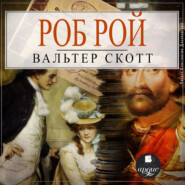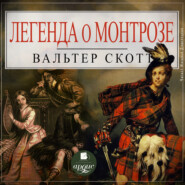По всем вопросам обращайтесь на: info@litportal.ru
(©) 2003-2024.
✖
Ivanhoe
Настройки чтения
Размер шрифта
Высота строк
Поля
“Would to God,” said the Lady Rowena, “he were here safely arrived, and able to bear arms in the approaching tourney, in which the chivalry of this land are expected to display their address and valour. Should Athelstane of Coningsburgh obtain the prize, Ivanhoe is like to hear evil tidings when he reaches England.—How looked he, stranger, when you last saw him? Had disease laid her hand heavy upon his strength and comeliness?”
“He was darker,” said the Palmer, “and thinner, than when he came from Cyprus in the train of Coeur-de-Lion, and care seemed to sit heavy on his brow; but I approached not his presence, because he is unknown to me.”
“He will,” said the lady, “I fear, find little in his native land to clear those clouds from his countenance. Thanks, good Pilgrim, for your information concerning the companion of my childhood.—Maidens,” she said, “draw near—offer the sleeping cup to this holy man, whom I will no longer detain from repose.”
One of the maidens presented a silver cup, containing a rich mixture of wine and spice, which Rowena barely put to her lips. It was then offered to the Palmer, who, after a low obeisance, tasted a few drops.
“Accept this alms, friend,” continued the lady, offering a piece of gold, “in acknowledgment of thy painful travail, and of the shrines thou hast visited.”
The Palmer received the boon with another low reverence, and followed Elgitha out of the apartment.
In the anteroom he found his attendant Anwold, who, taking the torch from the hand of the waiting-maid, conducted him with more haste than ceremony to an exterior and ignoble part of the building, where a number of small apartments, or rather cells, served for sleeping places to the lower order of domestics, and to strangers of mean degree.
“In which of these sleeps the Jew?” said the Pilgrim.
“The unbelieving dog,” answered Anwold, “kennels in the cell next your holiness.—St Dunstan, how it must be scraped and cleansed ere it be again fit for a Christian!”
“And where sleeps Gurth the swineherd?” said the stranger.
“Gurth,” replied the bondsman, “sleeps in the cell on your right, as the Jew on that to your left; you serve to keep the child of circumcision separate from the abomination of his tribe. You might have occupied a more honourable place had you accepted of Oswald’s invitation.”
“It is as well as it is,” said the Palmer; “the company, even of a Jew, can hardly spread contamination through an oaken partition.”
So saying, he entered the cabin allotted to him, and taking the torch from the domestic’s hand, thanked him, and wished him good-night. Having shut the door of his cell, he placed the torch in a candlestick made of wood, and looked around his sleeping apartment, the furniture of which was of the most simple kind. It consisted of a rude wooden stool, and still ruder hutch or bed-frame, stuffed with clean straw, and accommodated with two or three sheepskins by way of bed-clothes.
The Palmer, having extinguished his torch, threw himself, without taking off any part of his clothes, on this rude couch, and slept, or at least retained his recumbent posture, till the earliest sunbeams found their way through the little grated window, which served at once to admit both air and light to his uncomfortable cell. He then started up, and after repeating his matins, and adjusting his dress, he left it, and entered that of Isaac the Jew, lifting the latch as gently as he could.
The inmate was lying in troubled slumber upon a couch similar to that on which the Palmer himself had passed the night. Such parts of his dress as the Jew had laid aside on the preceding evening, were disposed carefully around his person, as if to prevent the hazard of their being carried off during his slumbers. There was a trouble on his brow amounting almost to agony. His hands and arms moved convulsively, as if struggling with the nightmare; and besides several ejaculations in Hebrew, the following were distinctly heard in the Norman-English, or mixed language of the country: “For the sake of the God of Abraham, spare an unhappy old man! I am poor, I am penniless—should your irons wrench my limbs asunder, I could not gratify you!”
The Palmer awaited not the end of the Jew’s vision, but stirred him with his pilgrim’s staff. The touch probably associated, as is usual, with some of the apprehensions excited by his dream; for the old man started up, his grey hair standing almost erect upon his head, and huddling some part of his garments about him, while he held the detached pieces with the tenacious grasp of a falcon, he fixed upon the Palmer his keen black eyes, expressive of wild surprise and of bodily apprehension.
“Fear nothing from me, Isaac,” said the Palmer, “I come as your friend.”
“The God of Israel requite you,” said the Jew, greatly relieved; “I dreamed—But Father Abraham be praised, it was but a dream.” Then, collecting himself, he added in his usual tone, “And what may it be your pleasure to want at so early an hour with the poor Jew?”
“It is to tell you,” said the Palmer, “that if you leave not this mansion instantly, and travel not with some haste, your journey may prove a dangerous one.”
“Holy father!” said the Jew, “whom could it interest to endanger so poor a wretch as I am?”
“The purpose you can best guess,” said the Pilgrim; “but rely on this, that when the Templar crossed the hall yesternight, he spoke to his Mussulman slaves in the Saracen language, which I well understand, and charged them this morning to watch the journey of the Jew, to seize upon him when at a convenient distance from the mansion, and to conduct him to the castle of Philip de Malvoisin, or to that of Reginald Front-de-Boeuf.”
It is impossible to describe the extremity of terror which seized upon the Jew at this information, and seemed at once to overpower his whole faculties. His arms fell down to his sides, and his head drooped on his breast, his knees bent under his weight, every nerve and muscle of his frame seemed to collapse and lose its energy, and he sunk at the foot of the Palmer, not in the fashion of one who intentionally stoops, kneels, or prostrates himself to excite compassion, but like a man borne down on all sides by the pressure of some invisible force, which crushes him to the earth without the power of resistance.
“Holy God of Abraham!” was his first exclamation, folding and elevating his wrinkled hands, but without raising his grey head from the pavement; “Oh, holy Moses! O, blessed Aaron! the dream is not dreamed for nought, and the vision cometh not in vain! I feel their irons already tear my sinews! I feel the rack pass over my body like the saws, and harrows, and axes of iron over the men of Rabbah, and of the cities of the children of Ammon!”
“Stand up, Isaac, and hearken to me,” said the Palmer, who viewed the extremity of his distress with a compassion in which contempt was largely mingled; “you have cause for your terror, considering how your brethren have been used, in order to extort from them their hoards, both by princes and nobles; but stand up, I say, and I will point out to you the means of escape. Leave this mansion instantly, while its inmates sleep sound after the last night’s revel. I will guide you by the secret paths of the forest, known as well to me as to any forester that ranges it, and I will not leave you till you are under safe conduct of some chief or baron going to the tournament, whose good-will you have probably the means of securing.”
As the ears of Isaac received the hopes of escape which this speech intimated, he began gradually, and inch by inch, as it were, to raise himself up from the ground, until he fairly rested upon his knees, throwing back his long grey hair and beard, and fixing his keen black eyes upon the Palmer’s face, with a look expressive at once of hope and fear, not unmingled with suspicion. But when he heard the concluding part of the sentence, his original terror appeared to revive in full force, and he dropt once more on his face, exclaiming, “ ‘I’ possess the means of securing good-will! alas! there is but one road to the favour of a Christian, and how can the poor Jew find it, whom extortions have already reduced to the misery of Lazarus?” Then, as if suspicion had overpowered his other feelings, he suddenly exclaimed, “For the love of God, young man, betray me not—for the sake of the Great Father who made us all, Jew as well as Gentile, Israelite and Ishmaelite—do me no treason! I have not means to secure the good-will of a Christian beggar, were he rating it at a single penny.” As he spoke these last words, he raised himself, and grasped the Palmer’s mantle with a look of the most earnest entreaty. The pilgrim extricated himself, as if there were contamination in the touch.
“Wert thou loaded with all the wealth of thy tribe,” he said, “what interest have I to injure thee?—In this dress I am vowed to poverty, nor do I change it for aught save a horse and a coat of mail. Yet think not that I care for thy company, or propose myself advantage by it; remain here if thou wilt—Cedric the Saxon may protect thee.”
“Alas!” said the Jew, “he will not let me travel in his train—Saxon or Norman will be equally ashamed of the poor Israelite; and to travel by myself through the domains of Philip de Malvoisin and Reginald Front-de-Boeuf—Good youth, I will go with you!—Let us haste—let us gird up our loins—let us flee!—Here is thy staff, why wilt thou tarry?”
“I tarry not,” said the Pilgrim, giving way to the urgency of his companion; “but I must secure the means of leaving this place—follow me.”
He led the way to the adjoining cell, which, as the reader is apprised, was occupied by Gurth the swineherd.—“Arise, Gurth,” said the Pilgrim, “arise quickly. Undo the postern gate, and let out the Jew and me.”
Gurth, whose occupation, though now held so mean, gave him as much consequence in Saxon England as that of Eumaeus in Ithaca, was offended at the familiar and commanding tone assumed by the Palmer. “The Jew leaving Rotherwood,” said he, raising himself on his elbow, and looking superciliously at him without quitting his pallet,
“and travelling in company with the Palmer to boot—”
“I should as soon have dreamt,” said Wamba, who entered the apartment at the instant, “of his stealing away with a gammon of bacon.”
“Nevertheless,” said Gurth, again laying down his head on the wooden log which served him for a pillow, “both Jew and Gentile must be content to abide the opening of the great gate—we suffer no visitors to depart by stealth at these unseasonable hours.”
“Nevertheless,” said the Pilgrim, in a commanding tone, “you will not, I think, refuse me that favour.”
So saying, he stooped over the bed of the recumbent swineherd, and whispered something in his ear in Saxon. Gurth started up as if electrified. The Pilgrim, raising his finger in an attitude as if to express caution, added, “Gurth, beware—thou are wont to be prudent. I say, undo the postern—thou shalt know more anon.”
With hasty alacrity Gurth obeyed him, while Wamba and the Jew followed, both wondering at the sudden change in the swineherd’s demeanour. “My mule, my mule!” said the Jew, as soon as they stood without the postern.
“Fetch him his mule,” said the Pilgrim; “and, hearest thou,—let me have another, that I may bear him company till he is beyond these parts—I will return it safely to some of Cedric’s train at Ashby. And do thou”—he whispered the rest in Gurth’s ear.
“Willingly, most willingly shall it be done,” said Gurth, and instantly departed to execute the commission.
“I wish I knew,” said Wamba, when his comrade’s back was turned, “what you Palmers learn in the Holy Land.”
“To say our orisons, fool,” answered the Pilgrim, “to repent our sins, and to mortify ourselves with fastings, vigils, and long prayers.”
“Something more potent than that,” answered the Jester; “for when would repentance or prayer make Gurth do a courtesy, or fasting or vigil persuade him to lend you
a mule?—I trow you might as well have told his favourite black boar of thy vigils and penance, and wouldst have gotten as civil an answer.”
“Go to,” said the Pilgrim, “thou art but a Saxon fool.”
“Thou sayst well,” said the Jester; “had I been born a Norman, as I think thou art, I would have had luck on my side, and been next door to a wise man.”
At this moment Gurth appeared on the opposite side of the moat with the mules. The travellers crossed the ditch upon a drawbridge of only two planks breadth, the narrowness of which was matched with the straitness of the postern, and with a little wicket in the exterior palisade, which gave access to the forest. No sooner had they reached the mules, than
the Jew, with hasty and trembling hands, secured behind the saddle a small bag of blue buckram, which he took from under his cloak, containing, as he muttered, “a change of raiment—only a change of raiment.” Then getting upon the animal with more alacrity and haste than could have been anticipated from his years, he lost no time in so disposing of the skirts of his gaberdine as to conceal completely from observation the burden which he had thus deposited “en croupe”.
The Pilgrim mounted with more deliberation, reaching, as he departed, his hand to Gurth, who kissed it with the utmost possible veneration. The swineherd stood gazing after the travellers until they were lost under the boughs of the forest path, when he was disturbed from his reverie by the voice of Wamba.
“Knowest thou,” said the Jester, “my good friend Gurth, that thou art strangely courteous and most unwontedly pious on this summer morning? I would I were a black Prior or a barefoot Palmer, to avail myself of thy unwonted zeal and courtesy—certes, I would make more out of it than a kiss of the hand.”
“Thou art no fool thus far, Wamba,” answered Gurth, “though thou arguest from appearances, and the wisest of us can do no more—But it is time to look after my charge.”
So saying, he turned back to the mansion, attended by the Jester.

















